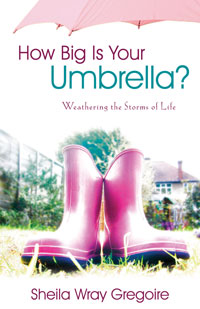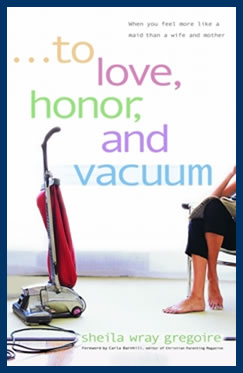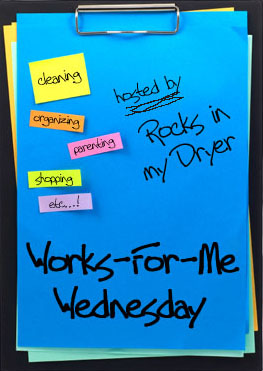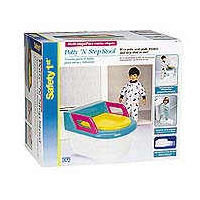 We have a wonderful guest today, Sheila Wray Gregoire. Sheila has a heart for ministering to women who need encouragement in their homes and marriages, and she writes the “Reality Check” syndicated newspaper column. As the author of four humorous, inspirational books, Sheila has so much to share with us!
We have a wonderful guest today, Sheila Wray Gregoire. Sheila has a heart for ministering to women who need encouragement in their homes and marriages, and she writes the “Reality Check” syndicated newspaper column. As the author of four humorous, inspirational books, Sheila has so much to share with us!
Hi Sheila. Welcome to Mom 2 Mom Connection! How did you get interested in ministering to women?
Well, it turns out I was born a woman. Honestly. I don’t think I ever was a kid. I had a lonely childhood, due to my parents’ divorce, but I always knew that God loved me. And I knew that the only hope I had of finding my own peace as an adult was to make sure I was smack in the middle of God’s will for my life.
Have you always wanted to be a writer?
How I got started writing is a funny story. I never meant to. When my son was in the hospital, I overheard a nurse tell another nurse a really funny story of something she had done that weekend. I sent it into Reader’s Digest and made $160!
Wow! I’ve heard it’s really tough to get into Reader’s Digest. Way to go!
I figured that was pretty easy money, so I started writing for magazines. And that’s when I realized that I could use writing as a way to help other women find joy in their lives. It’s been a really fun ride!
Can you tell us a little about your family?
I have two girls who pick at each other like crazy and love each other whole-heartedly. The dinner table is far too full of jokes about flatulent gas and belches for my liking, but what can you do? Rebecca is 12 and Katie is 9, and we hoped they’d grow out of it, but perhaps that’s wishful thinking.

I’ve been married to Keith for 15 years, and happily married to him for about 11. Those four years factor quite heavily in my book, Honey, I Don’t Have a Headache Tonight!
I’m also the mom to Christopher, a baby who will forever be 29 days old, the age he was when he left us and went to be with Jesus. You face a crossroads when you lose a child. Keith and I decided we were going to cling to each other and not let his death pull us apart, and I’m so glad that we did.
Sheila, I read your story, The Least of These, about losing Christopher, and it ministered to me, as I’m sure it touches all who read about your experience.

I write more about what we went through in my latest book, How Big Is Your Umbrella, to help people who are yelling and raging at God, to hear the things that he often whispers back during our darkest times.
You’ve written several other books to encourage women. To Love, Honor, and Vacuum has the hilarious subtitle, “When you feel like a maid more than a mother.” How did you come up with that?
I don’t know how I come up with my titles. They always appear before the book does. I have about 10 other good titles in my head, but I don’t know what those books are supposed to be about! Hopefully it will come to me.
Do you have any suggestions for those of us who are feeling a little burned out on the never-ending housework treadmill?
If you’re feeling burned out, I think it’s important to remember this: God cares more about you than he does about the size of the dust bunnies under your bed. So relax! Stop aiming for perfect. Your house is never going to be perfect all at the same time anyway, so why try?
When we aim for perfect, we cocoon. No one can ever come over because they might see how we really live! So we spend our lives yelling at our kids for making messes, and watching the Home & Garden channel and feeling so depressed and guilty that we pull out the bag of chips. It’s completely self-defeating.
We need our homes to be comfortable. We don’t need them to be perfect. And there’s a big difference. Perfect means people are scared to come in because they might mess something up. Comfortable means people feel like they can be themselves.
Of course, comfort implies a certain level of cleanliness. You can’t be scared of catching some communicable disease in the bathroom or kitchen. But it’s okay if your knitting is lying around. Mine sure is!
Is it possible for us to get our husbands and children to help out with the housework?
Children—absolutely! You mean they’re not already?? Husbands, we’ll get to that in a minute. That’s a little thornier.
But kids need to be doing housework. Not helping with housework. Because it’s not your job! It’s theirs, too. Think of it this way: the best gift you can give your future daughter-in-law is a son who cleans toilets. That will be a good marriage!

Wow! I never thought of it that way. I’ve got some training to do! Sheila, what kind of housework do you think kids should be able to do?
By “houseworkâ€, I don’t mean tidying their rooms and making their beds. That’s just looking after themselves.
Kids need to be trained to think of others. Even a three-year-old can dust a coffee table, albeit not well. In my book, I outline a way we can tie allowances to chores, so that kids learn to manage money, too. But get kids working! It’s important for character development, and it’s important for your sanity.
As for husbands, it would be very nice to have them help, and I have lots of tips in my book of how you can encourage them in that regard. But a word of caution: you can’t make him do anything, nor should you. And nagging never works.
Men thrive on appreciation, not condemnation. If we appreciate them when they do help, rather than point out how they did it wrong, they may be more inclined to help again.
I also think it’s more important for men to help with the childcare than to help with the housework. Each family is different, and in some families the husband works outside the home a lot more than the wife does.
It’s probably more appropriate there that she does more of the housework. But he still needs to spend time with the kids, no matter how much time he spends at work. When my husband was working ridiculous hours during his medical training, I didn’t want him to come home and vacuum. I wanted him to come home and bathe the kids. And I still think that’s a good rule!
Right now, I’m typing this and he’s reading to my daughters before bed. And I’m perfectly content, even though the dishes need doing.
Does housework really have an impact on marriages?
You betcha. Just ask any woman who feels taken for granted! The problem, I think, is that women today are often run ragged with keeping up with the house, and the kids, and the dentist appointments, and all that stuff that men find rather boring and not that important.
And if women feel like they do the “boring†stuff, while men get to do the fun stuff, like working, then they can feel like their husbands don’t really respect them. They just expect their wives to be there to look after them. Well, what’s the difference between that and hiring a maid, other than what happens after dark, so to speak?
I’m glad you’re bringing this point up — because I sometimes feel like a maid. Since I’m a stay-at-home mom, I feel like I shouldn’t ask for help with housework. (It’s my job, right?) My husband works all day and spends three hours in the car commuting. But I’m glad to know I’m not the only one who feels this way.
In the book, I recount the story of my friend Diane, who was feeling very disrespected. “Every day,†she told me, “I lay out his clothes, look after the kids, pick up after everybody, make dinner, and then he gets home and eats it in front of the TV. He goes out with the friends, and he never offers to bathe the kids or anything. Then he gets back late, and you know what he wants?†(I think we all know what he wants.)
Diane felt like he never showed her any appreciation or respect. And when women feel that way, it’s really hard to feel intimate with our mates.
What To Love, Honor and Vacuum does is to show women how we can change how we act. When we do that, he’s bound to change, too.
But even if he doesn’t, we’ll still end up happier and more at peace. It’s taking control back into our own hands, and going to God for our fulfillment, rather than trying to “fix†our husbands. And when we take steps to act appropriately, and to be neither doormats nor tyrants, it’s amazing how our relationships can improve.
That sounds so helpful! Sheila, from your time spent speaking and writing to women, what do you think is the biggest challenge facing today’s mothers?
We expect way too much of ourselves. Fifty years ago, when my father-in-law was a boy, his mother would make him a sandwich, and then he would run off to an ice pond a mile away from their house with eight other boys and play hockey all day.
No adults around. No helmets. No protection whatsoever. And she was considered a good mother.
Today, we’d be reported for that. Our culture has completely changed. And we expect ourselves to have perfect kids and perfect homes and sometimes even a perfect career, and we forget that all God wants is that we be obedient. And He doesn’t ask us to have perfect living rooms. He asks us to share who we really are. And it’s okay to not be perfect. And it’s much more fun!
That’s true! Can you tell us more about your latest book?
How Big Is Your Umbrella: Weathering the Storms of Life, is a little bit different for me. I usually write strictly about parenting, but this book is about losing — losing a child, losing a job, losing a marriage, losing whatever is dearest to us.
So often when a friend is hurting we don’t know what to say. This book is short and non-threatening, a good gift for a friend who needs some encouragement.
Do you have any closing advice for today’s moms who are feeling a bit frazzled — but want to hang in there and be the best wives and moms they can be?
God first, husband second, you third, kids last.
I think we tend to completely reverse that. But give God time, even if it means praying in the bubble bath while eating chocolates. And don’t let kids interfere with your marriage! Kids need you to have a strong marriage, even more than they need you to spend a lot of time with them. Get those priorities straight, and everything falls into place.
Thank you so much, Sheila! This is great advice!
Sheila Wray Gregoire writes a syndicated newspaper parenting column, Reality Check, which she sends out by ezine every week. You can sign up for it here, and you’ll be entered in a draw to win a bunch of Sheila’s books and audio recordings! She’ll make the draw April 30.











 We have a wonderful guest today,
We have a wonderful guest today, 



 Surprise! Such a lovely topic on this chilly February morning. I know … I normally discuss something more pleasant such as books. But today I want to track a little progress we’re making on the “toilet training” front (which started today).
Surprise! Such a lovely topic on this chilly February morning. I know … I normally discuss something more pleasant such as books. But today I want to track a little progress we’re making on the “toilet training” front (which started today).